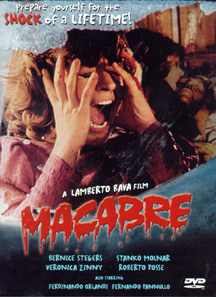Lamberto Bava's Macabre: Just Another One of Those Days 
Macabre, DVD released 2001 by Anchor Bay Entertainment; unrated, 90 minutes, color, widescreen (1.85:1 aspect ratio) enhanced for 16x9 TVs, Dolby digital mono sound, includes theatrical trailer, “A Head for Horror” documentary, text biography of Lamberto Bava. Suggested retail price: $29.98.
* * *
 While an adulterous couple dallies in a blind man’s spare bedroom, the woman’s daughter is drowning her little brother in the bathtub...speeding to the scene of the murder, the couple’s car crashes, and the man is decapitated...just another one of those days in the world of Italian horror flicks.
While an adulterous couple dallies in a blind man’s spare bedroom, the woman’s daughter is drowning her little brother in the bathtub...speeding to the scene of the murder, the couple’s car crashes, and the man is decapitated...just another one of those days in the world of Italian horror flicks.
That’s the set-up in Macabre, a.k.a. Frozen Terror, a slow-paced but satisfyingly weird little Italian movie set in America’s horror capital, New Orleans, and supposedly inspired by true events.
Horror fans impressed by the kinetic pace, surrealism, and startling perversity of Demons and Demons 2, Italian director Lamberto Bava’s best-known films, will find his first film to be more mundane. It has only a few of the visceral shocks found in the director’s later work, but it is a sincere attempt to do a film in the gothic vein.
Lamberto Bava is the son of Mario Bava, director of the classic Black Sunday (the 1961 movie with Barbara Steele, not the one with the blimp). The elder Bava is the granddaddy of the modern Italian horror film, and he set the agenda for spaghetti horrors to come: lush expressionistic photography, muddled plots punctuated by shocks, surreal imagery. His career spanned the gap between the last remnants of the classic era in the early ’60s to the slasher-gore era of the 1970s, and he turned out movies of interest to both generations.
Lamberto aided his father on a couple of movies before releasing his first solo project in 1980. Macabre is said to be an extrapolation on a newspaper story in which a bereaved woman took her mourning a bit too far. In the movie, this woman, having lost her son and her lover in one day, is rehabbed in a mental institution and released. She moves into the room where she once had her adulterous assignations, in the house of a sexually frustrated and conveniently blind landlord. (His blindness accounts for his taste in clothes, but there’s no excuse for the other characters.) Bernice Stegers, later featured in Fellini’s City of Women (1981), brings a toothy, wild look and more than a bit of nudity to the lead role, as she proceeds to further sexually frustrate her host with some gratuitous teasing. Stanko Molnar is competent as the blind fellow who is trying to figure out if his guest is crazy, or if she is really having sexual encounters with her lover’s ghost, who is unfortunately named “Fred.” Meanwhile, her equally toothy and wild young daughter, Veronica Zinny, is plotting against mommy, and this subplot helps bring things to a brief grand guignol finish.
Big fans of Psycho-style wackiness will probably enjoy this movie, but as a thriller, it’s rather tepid and excruciatingly slow, there being only about an hour’s worth of dialogue and a half hour of mystery stretched out to ninety minutes. Just what is this woman keeping locked in her freezer? If you’ve seen a few horror films, you can guess, and the climactic revelations won’t be all that climactic.
The movie has many of the usual problems of Italian horrors, some of which have to do with low budgets. Macabre allegedly takes place in New Orleans, but the filmmakers could only afford three days of location shooting, and while the reliance on indoor sets might, in more experienced hands, give the movie a claustrophobic feel, here it seems merely limiting. Bava follows the Italian practice of shooting silent and dubbing in all sound later; in this film, a ghost story badly in need of creepy sound effects, there’s a flat uninteresting soundtrack featuring some unconvincing southern accents.
The nuttiness at the heart of the story, nicely conveyed by Stegers’s over-the-top performance, may carry the film for some horror fans, however. And serious scholars of Italian fears will surely want to give this unpretentious oddity a spin.
